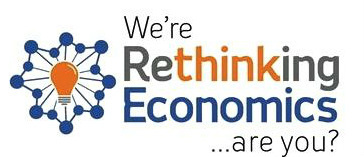From Lars Syll In an issue of the journal Fronesis yours truly and a couple of other academics (e.g. Julie Nelson, Tony Lawson, and Phil Mirowski) made an effort at introducing its readers to heterodox economics and its critique of mainstream economics. Rather unsurprisingly this hasn’t pleased the Swedish economics establishment. On the mainstream economics blog Ekonomistas, professor Daniel Waldenström rode out to defend the mainstream with the nowadays standard defence — heterodox critics haven’t understood that mainstream economics today has gone through a pluralist and empirical revolution. Since heterodox critics haven’t noticed that, their views on the mainstream project is more or less irrelevant. Well, the problem with that defence is that it has pretty little with reality to
Topics:
Lars Pålsson Syll considers the following as important: Uncategorized
This could be interesting, too:
tom writes The Ukraine war and Europe’s deepening march of folly
Stavros Mavroudeas writes CfP of Marxist Macroeconomic Modelling workgroup – 18th WAPE Forum, Istanbul August 6-8, 2025
Lars Pålsson Syll writes The pretence-of-knowledge syndrome
Dean Baker writes Crypto and Donald Trump’s strategic baseball card reserve
from Lars Syll
 In an issue of the journal Fronesis yours truly and a couple of other academics (e.g. Julie Nelson, Tony Lawson, and Phil Mirowski) made an effort at introducing its readers to heterodox economics and its critique of mainstream economics. Rather unsurprisingly this hasn’t pleased the Swedish economics establishment.
In an issue of the journal Fronesis yours truly and a couple of other academics (e.g. Julie Nelson, Tony Lawson, and Phil Mirowski) made an effort at introducing its readers to heterodox economics and its critique of mainstream economics. Rather unsurprisingly this hasn’t pleased the Swedish economics establishment.
On the mainstream economics blog Ekonomistas, professor Daniel Waldenström rode out to defend the mainstream with the nowadays standard defence — heterodox critics haven’t understood that mainstream economics today has gone through a pluralist and empirical revolution. Since heterodox critics haven’t noticed that, their views on the mainstream project is more or less irrelevant.
Well, the problem with that defence is that it has pretty little with reality to do.
When mainstream economists today try to give a picture of modern economics as a pluralist enterprise, they silently ‘forget’ to mention that the change and diversity that gets their approval only takes place within the analytic-formalistic modelling strategy that makes up the core of mainstream economics. You’re free to take your analytical formalist models and apply it to whatever you want — as long as you do it with a modeling methodology that is acceptable to the mainstream. If you do not follow this particular mathematical-deductive analytical formalism you’re not even considered doing economics. If you haven’t modeled your thoughts, you’re not in the economics business. But this isn’t pluralism. It’s a methodological reductionist straightjacket.
You’re free to take your analytical formalist models and apply it to whatever you want — as long as you do it with a modeling methodology that is acceptable to the mainstream. If you do not follow this particular mathematical-deductive analytical formalism you’re not even considered doing economics. If you haven’t modeled your thoughts, you’re not in the economics business. But this isn’t pluralism. It’s a methodological reductionist straightjacket.
To most mainstream economists you only have knowledge of something when you can prove it, and so ‘proving’ theories with their models via deductions is considered the only certain way to acquire new knowledge. This is, however, a view for which there is no warranted epistemological foundation. Outside mathematics and logics, all human knowledge is conjectural and fallible.
Validly deducing things in closed analytical-formalist-mathematical models — built on atomistic-reductionist assumptions — doesn’t much help us understand or explain what is taking place in the real world we happen to live in. Validly deducing things from patently unreal assumptions — that we all know are purely fictional — makes most of the modelling exercises pursued by mainstream macroeconomists rather pointless. It’s simply not the stuff that real understanding and explanation in science is made of. Had mainstream economists not been so in love with their smorgasbord of models, they would have perceived this too. Telling us that the plethora of models that make up modern macroeconomics ‘are not right or wrong,’ but ‘just more or less applicable to different situations,’ is nothing short of hand waving.
Take macroeconomics as an example. Yes, there is a proliferation of macromodels nowadays — but it almost exclusively takes place as a kind of axiomatic variation within the standard DSGE modelling framework. And — no matter how many thousands of models mainstream economists come up with, as long as they are just axiomatic variations of the same old mathematical-deductive ilk, they will not take us one single inch closer to giving us relevant and usable means to further our understanding and explanation of real economies.
Most mainstream economists seem to have no problem with this lack of fundamental diversity — not just path-dependent elaborations of the mainstream canon — and the vanishingly little real world relevance that characterise modern macroeconomics. To these economists there is nothing basically wrong with ‘standard theory.’ As long as policy makers and economists stick to ‘standard economic analysis’ — DSGE — everything is fine. Economics is just a common language and method that makes us think straight and reach correct answers.
Most mainstream neoclassical economists are not for pluralism. They are fanatics insisting on using an axiomatic-deductive economic modelling strategy. To yours truly, this attitude is nothing but a late confirmation of Alfred North Whitehead’s complaint that “the self-confidence of learned people is the comic tragedy of civilisation.”
Daniel Waldenström — like so many other mainstream economists today — seems to maintain that new imaginative empirical methods — such as natural experiments, field experiments, lab experiments, RCTs — help us to answer questions concerning the validity of economic theories and models.
Yours truly beg to differ. There are few real reasons to share his optimism on the alleged pluralist and empirical revolution in economics.
I am basically — though not without reservations — in favour of the increased use of experiments and field studies within economics. Not least as an alternative to completely barren ‘bridge-less’ axiomatic-deductive theory models. My criticism is more about aspiration levels and what we believe that we can achieve with our mediational epistemological tools and methods in the social sciences.
The increasing use of natural and quasi-natural experiments in economics during the last couple of decades has led several prominent economists to triumphantly declare it as a major step on a recent path toward empirics, where instead of being a deductive philosophy, economics is now increasingly becoming an inductive science.
In randomised trials the researchers try to find out the causal effects that different variables of interest may have by changing circumstances randomly — a procedure somewhat (‘on average’) equivalent to the usual ceteris paribus assumption).
Besides the fact that ‘on average’ is not always ‘good enough,’ it amounts to nothing but hand waving to simpliciter assume, without argumentation, that it is tenable to treat social agents and relations as homogeneous and interchangeable entities.
Randomisation is used to basically allow the econometrician to treat the population as consisting of interchangeable and homogeneous groups (‘treatment’ and ‘control’). The regression models one arrives at by using randomised trials tell us the average effect that variations in variable X has on the outcome variable Y, without having to explicitly control for effects of other explanatory variables R, S, T, etc., etc. Everything is assumed to be essentially equal except the values taken by variable X.
Just as e.g. econometrics, randomisation promises more than it can deliver, basically because it requires assumptions that in practice are not possible to maintain.
Like econometrics, randomisation is basically a deductive method. Real target systems are seldom epistemically isomorphic to our axiomatic-deductive models/systems, and even if they were, we still have to argue for the external validity of the conclusions reached from within these epistemically convenient models/systems. Causal evidence generated by randomisation procedures may be valid in ‘closed’ models, but what we usually are interested in, is causal evidence in the real target system we happen to live in.
‘Ideally controlled experiments’ tell us with certainty what causes what effects — but only given the right ‘closures.’ Making appropriate extrapolations from (ideal, accidental, natural or quasi) experiments to different settings, populations or target systems, is not easy. ‘It works there ‘s no evidence for ‘it will work here.’ Causes deduced in an experimental setting still have to show that they come with an export-warrant to the target population/system. The causal background assumptions made have to be justified, and without licenses to export, the value of ‘rigorous’ and ‘precise’ methods — and ‘on-average-knowledge’ — is despairingly small.
So, no, I find it hard to share Waldenström’s and other mainstream economists’ enthusiasm and optimism on the value of the latest ’empirical’ trends in mainstream economics. I would argue that although different ’empirical’ approaches have been — more or less — integrated into mainstream economics, there is still a long way to go before economics has become a truly empirical science.
Heterodox critics are not ill-informed about the development of mainstream economics. Its methodology is still the same basic neoclassical one. It’s still non-pluralist. And although more and more economists work within the field of ’empirical’ economics, the foundation and ‘self-evident’ bench-mark is still of the neoclassical deductive-axiomatic ilk.
Sad to say, but we still have to wait for the revolution that will make economics an empirical and truly pluralist and relevant science. Until then — if you’r familiar with the Swedish language — why not read Fronesis and get a glimpse of the future to come? Mainstream economics belongs to the past.
